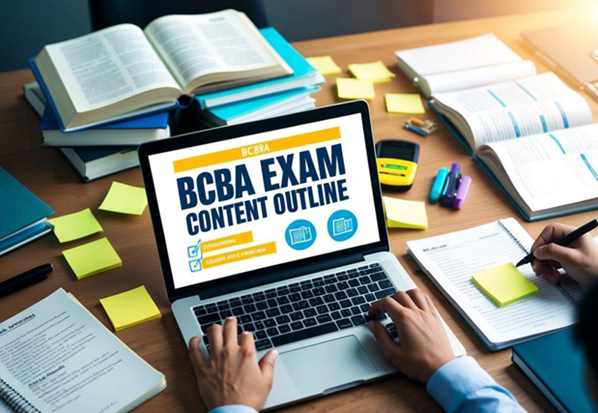
The Board Certified Behavior Analyst (BCBA) exam is a big step for anyone looking to become a certified behavior analyst. I’ve seen many people feel nervous about this test, but I’m here to break it down for you. Effective BCBA exam prep is crucial for success in this challenging assessment. The exam covers key areas like basic principles of behavior analysis, measurement, assessment, and behavior change systems. It’s designed to make sure you really know your stuff.
I want to help you get ready for this important test. The BCBA exam has multiple-choice questions that test your knowledge and skills in applied behavior analysis. It’s not just about memorizing facts – you’ll need to show you can use what you’ve learned in real-life situations.
Getting certified as a BCBA can open up lots of career options. It’s a respected credential in fields like education, healthcare, and social services. By understanding the exam content, you’ll be better prepared to pass and start your career as a behavior analyst.
Key Takeaways
- The BCBA exam tests knowledge of behavior analysis principles and applications
- Preparation involves studying core competencies and practicing applied skills
- Passing the exam leads to certification and expanded career opportunities
Exam Overview and Eligibility
The BCBA exam is a crucial step for behavior analysts seeking certification. It tests knowledge of applied behavior analysis through multiple-choice questions on key content areas.
BCBA Exam Structure and Content Areas
The exam covers several important topics in behavior analysis. These include:
- Foundations of Behavior Analysis
- Concepts and Principles
- Measurement, Data Display, and Interpretation
- Experimental Design
- Ethics
- Behavior Change Procedures
I find it helpful to focus on each area equally during study. The BACB updates content periodically, so I always check their website for the most current information.
Eligibility Requirements and Application Process
To take the BCBA exam, I need to meet specific requirements. These include:
- A graduate degree in behavior analysis or a related field
- Coursework in behavior analysis
- Supervised practical experience
Once I meet these, I submit an application to the BACB. This includes:
- Completing the online application form
- Paying the application fee
- Submitting required documents
After approval, I can schedule my exam.
Computer-Based Testing and Exam Format
The BCBA exam is computer-based and given at Pearson VUE testing centers. Key points about the format:
- 185 multiple-choice questions
- 4 hours to complete
- Questions may include graphs or data
- No penalty for wrong answers
I can mark questions to review later. The computer interface is user-friendly, with a timer and question navigator. I find it helpful to practice with similar formats before the actual exam.
Preparation and Study Strategies
Getting ready for the BCBA exam takes time and effort. I’ll share some key ways to prepare effectively and boost your chances of success.
Study Materials and Resources
I recommend starting with the Cooper book, which is a core text for behavior analysis. It covers many exam topics in depth. I also use practice flashcards called SAFMEDs to memorize key terms and concepts quickly.
Online study guides and video courses can supplement textbooks. I find these helpful for reviewing tricky topics. The BACB website has a task list that outlines exam content. I use this to guide my studies.
Study groups with other BCBA candidates help me stay motivated. We quiz each other and explain concepts, which improves our understanding.
Developing an Effective Study Plan
I create a study schedule that fits my daily routine. I set aside specific times for studying and stick to them. This helps me stay consistent.
I break down the task list into smaller chunks. I focus on one area at a time instead of trying to cover everything at once. This makes studying less overwhelming.
I use a mix of study methods. I read textbooks, watch videos, and do practice questions. Changing it up keeps me engaged and helps the information stick.
I track my progress to stay motivated. I note which topics I’ve covered and how well I understand them. This shows me where I need more work.
Mock Exams and Practice Questions
Taking practice exams is crucial. I use them to get familiar with the exam format and time limits. This helps reduce test anxiety on exam day.
I do lots of practice questions from different sources. This exposes me to various question types and helps me spot my weak areas.
After each mock exam, I review my mistakes carefully. I focus extra study time on topics where I scored low. This targeted approach improves my weak spots.
I time myself when doing practice questions. This helps me get used to working under pressure and managing my time during the real exam.

Core Areas of Competence
The BCBA exam tests key skills across several important areas. These areas cover the main things a behavior analyst needs to know to do their job well.
Behavior Assessment and Measurement
I focus on learning how to assess and measure behavior accurately. This means figuring out why behaviors happen and how often they occur. I use different tools to collect data, like observation forms and rating scales.
I also learn to pick the right assessment method for each situation. Sometimes I might do interviews, while other times I’ll use standardized tests. The goal is always to get a clear picture of the behavior.
Knowing how to graph and analyze data is crucial too. I practice creating visual displays of behavior patterns over time. This helps me spot trends and make better decisions about treatments.
Intervention, Behavior Change Procedures, and Behavior-Analytic Services
I study many ways to change behavior for the better. This includes learning about reinforcement, punishment, and extinction. I also explore more complex strategies like shaping and chaining.
A big part of this area is designing and implementing behavior intervention plans. I learn to tailor these plans to each person’s needs and goals. This means considering factors like their environment and support system.
I also focus on teaching new skills and replacing problem behaviors with more positive ones. This might involve using techniques like prompting or modeling to help people learn.
Research, Experimental Design, and Analysis
I dive into the scientific side of behavior analysis here. This means learning how to design and run experiments to test behavior theories. I practice coming up with research questions and hypotheses.
I also study different types of research designs, like single-subject and group designs. Each has its own strengths and uses. I learn when to use which type for different research goals.
Data analysis is another key part. I practice using statistical tests to make sense of research results. This helps me figure out if an intervention really worked or if the changes were just by chance.
Ethics and Professional Conduct
I learn about the ethical guidelines that govern behavior analysis. This includes things like respecting client privacy and getting informed consent. I also study how to handle tricky situations that might come up in practice.
Professional conduct is equally important. I focus on how to communicate clearly with clients, families, and other professionals. I also learn about keeping good records and following laws and regulations.
Another big part is staying up-to-date with new research and best practices. This means learning how to read and evaluate scientific papers critically. It also involves knowing when to seek help or supervision for tough cases.




